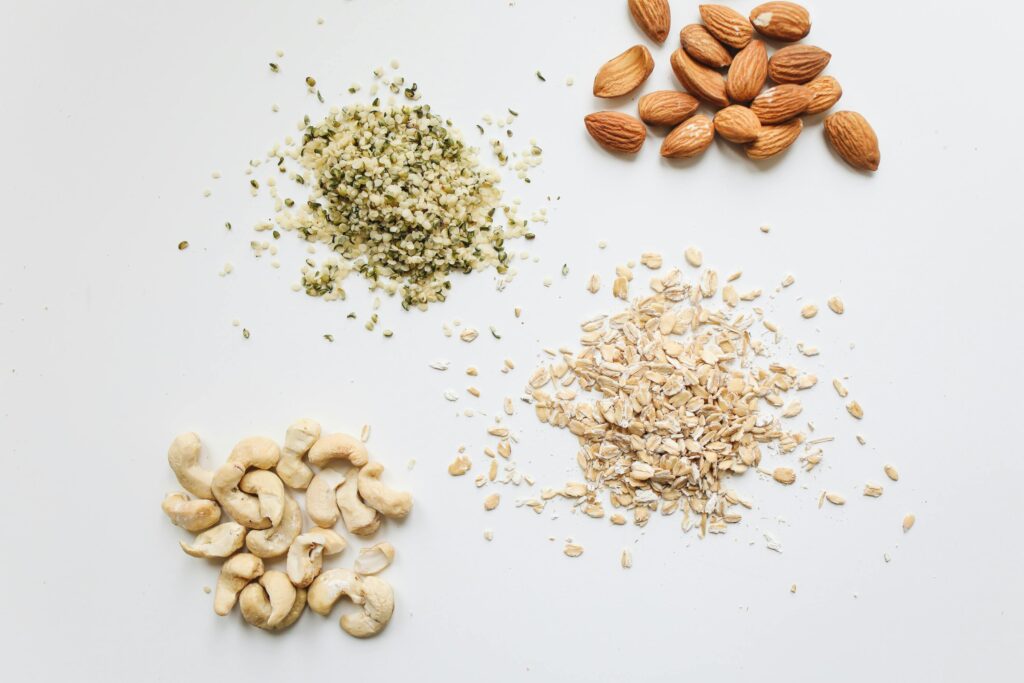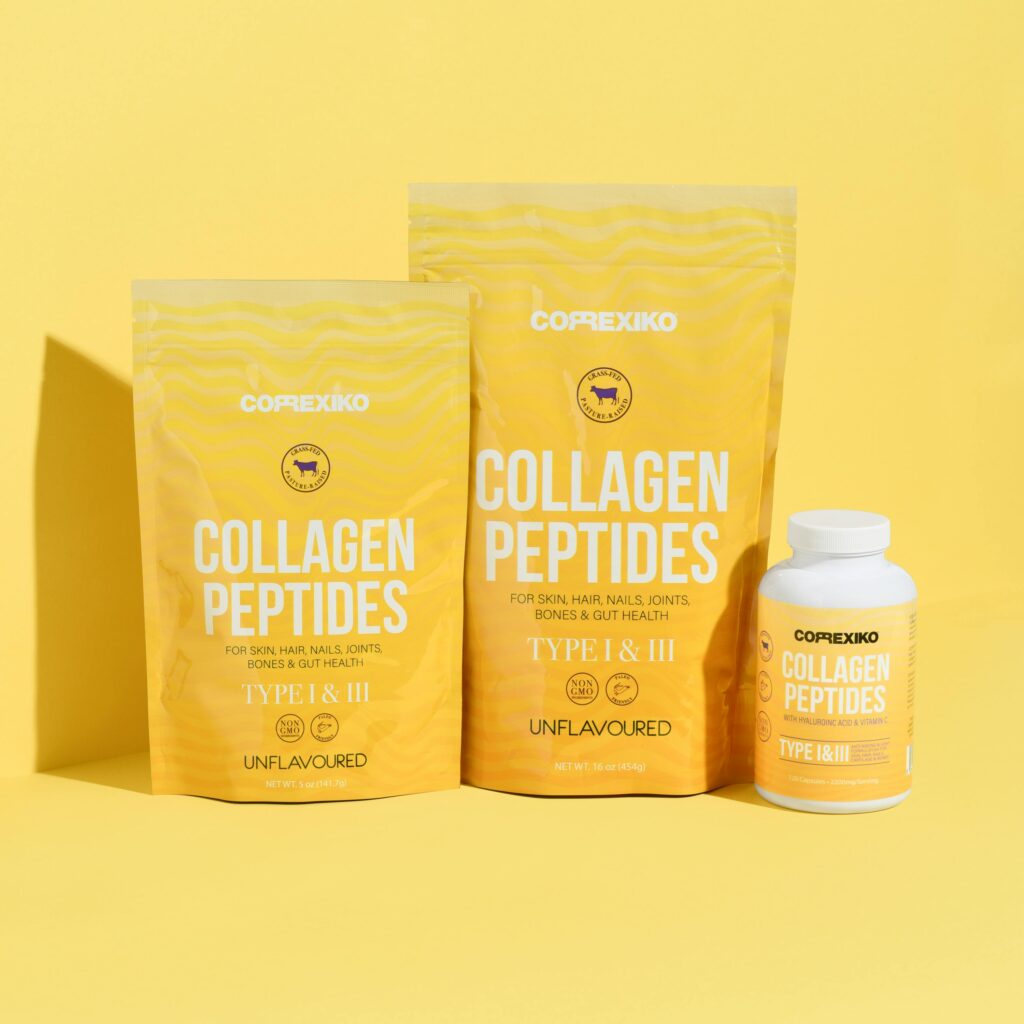In today’s fast-paced world, vitamins & supplements have become a go-to solution for boosting health, filling nutritional gaps, and enhancing well-being. But with so many options available, how do you know what’s right for you? In this guide, we’ll break down the 13 essential vitamins, the top three to take daily, and the difference between vitamins and supplements. We’ll also explore their benefits, possible side effects, and whether they’re safe for everyday use. Plus, we’ll uncover the best supplements for glowing, clear skin. Let’s dive in!
What are the 13 essential vitamins supplement?
The 13 essential vitamins are divided into two categories: fat-soluble and water-soluble. Each plays a vital role in maintaining overall health.
Fat-Soluble Vitamins (Stored in the Body’s Fat Tissues)
- Vitamin A – Supports vision, immune function, and skin health.
- Vitamin D – Essential for bone health, immune function, and calcium absorption.
- Vitamin E – A powerful antioxidant that protects cells and supports skin health.
- Vitamin K – Helps with blood clotting and bone health.
Water-Soluble Vitamins (Not Stored, Need Regular Replenishment)
- Vitamin C – Boosts immunity, supports skin health, and aids in wound healing.
- Vitamin B1 (Thiamine) – Helps convert food into energy and supports nerve function.
- Vitamin B2 (Riboflavin) – Supports metabolism and red blood cell production.
- Vitamin B3 (Niacin) – Helps with digestion, skin health, and nervous system function.
- Vitamin B5 (Pantothenic Acid) – Supports hormone production and energy metabolism.
- Vitamin B6 (Pyridoxine) – Aids brain development, mood regulation, and immune function.
- Vitamin B7 (Biotin) – Essential for healthy hair, skin, and nails.
- Vitamin B9 (Folate/Folic Acid) – Crucial for DNA production and cell growth, especially during pregnancy.
- Vitamin B12 (Cobalamin) – Supports red blood cell formation, brain function, and energy levels.
Each of these vitamins plays a crucial role in maintaining a balanced and healthy body. While a well-rounded diet can provide them naturally, supplements can help fill any gaps when needed.
What are the 3 best vitamins to take?

The three best vitamins to take depend on individual health needs, but generally, these three are essential for overall well-being:
1. Vitamin D – The Sunshine Vitamin ☀️
- Supports bone health by helping the body absorb calcium.
- Boosts the immune system and reduces inflammation.
- Helps improve mood and may prevent depression.
- Many people are deficient, especially those who don’t get enough sun exposure.
2. Vitamin C – The Immunity Booster 🍊
- Strengthens the immune system and helps fight infections.
- Acts as a powerful antioxidant, protecting cells from damage.
- Supports collagen production, keeping skin firm and youthful.
- Helps with iron absorption, preventing anemia.
3. Vitamin B12 – The Energy Vitamin ⚡
- Essential for red blood cell production and preventing fatigue.
- Supports brain function and may reduce the risk of cognitive decline.
- Helps with nerve health, preventing tingling or numbness in the hands and feet.
- Crucial for vegetarians and vegans, as it’s mainly found in animal-based foods.
While these vitamins are beneficial for most people, it’s always best to get tested for deficiencies and consult a healthcare provider before taking supplements.
Is there a difference between vitamins and supplements?

Yes, there is a difference between vitamins and supplements, though the terms are often used interchangeably.
Vitamins
- Natural compounds that the body needs in small amounts for various functions.
- Found in food sources like fruits, vegetables, dairy, and meat.
- Examples: Vitamin C (oranges), Vitamin D (sunlight, fish), Vitamin B12 (eggs, meat).
- Essential for metabolism, immunity, and overall health.
Supplements
- A broader category that includes vitamins, minerals, herbs, amino acids, and other nutrients.
- Can be natural or synthetic and come in various forms (pills, powders, liquids).
- Examples: Multivitamins, fish oil, probiotics, protein powders.
- Used to fill nutritional gaps, boost performance, or address specific health concerns.
Key Difference
- All vitamins can be supplements, but not all supplements are vitamins.
- Supplements can contain a mix of vitamins, minerals, and other beneficial compounds.
In short, vitamins are specific nutrients your body needs, while supplements are products that provide those nutrients or other health benefits.
Benefits of Taking Vitamin Supplements
While a balanced diet is the best way to get essential nutrients, vitamin supplements can offer several benefits, especially for those with deficiencies or specific health needs. Here are some key advantages:
1. Fills Nutritional Gaps
- Many people don’t get enough vitamins from food alone due to poor diet, food restrictions, or lifestyle factors.
- Supplements help ensure you meet daily nutritional requirements.
2. Supports Immune Health
- Vitamins like C, D, and Zinc strengthen the immune system, helping the body fight infections.
- Beneficial for those prone to colds, flu, or other illnesses.
3. Boosts Energy Levels
- B vitamins (B12, B6, B1) play a crucial role in energy production and preventing fatigue.
- Helps improve focus, mental clarity, and overall stamina.
4. Promotes Healthy Skin, Hair, and Nails
- Biotin (B7), Vitamin C, and Vitamin E support collagen production, skin hydration, and hair strength.
- Reduces signs of aging and promotes a youthful glow.
5. Supports Bone and Joint Health
- Vitamin D, Calcium, and Magnesium help maintain strong bones and prevent osteoporosis.
- Beneficial for aging individuals or those at risk of bone-related conditions.
6. Aids Brain Function and Mental Health
- Omega-3, Vitamin B12, and Folate support brain function, memory, and cognitive health.
- Helps reduce the risk of depression and anxiety.
7. Enhances Heart Health
- Omega-3 fatty acids, CoQ10, and B vitamins support cardiovascular function.
- Can help lower inflammation, cholesterol, and blood pressure.
8. Supports Pregnancy and Fetal Development
- Folic Acid (B9), Iron, and DHA are crucial for pregnant women to prevent birth defects and support baby growth.
9. Helps with Digestive Health
- Probiotics, Fiber, and Digestive Enzymes promote gut health and improve digestion.
- Helps manage bloating, constipation, and gut imbalances.
10. May Help Prevent Chronic Diseases
- Antioxidants (Vitamins A, C, and E) help fight free radicals that contribute to aging and chronic illnesses.
- Can support long-term health and wellness.
Should You Take Supplements?
If you have a well-balanced diet, you may not need extra vitamins, but for those with deficiencies, dietary restrictions, or specific health concerns, supplements can be a great way to maintain overall well-being. Always consult a healthcare professional before starting any new supplement regimen.
Do supplements have side effects?
Yes, supplements can have side effects, especially if taken in excess, combined with medications, or used incorrectly. While they offer many health benefits, it’s important to be aware of potential risks.
Common Side Effects of Supplements
1. Digestive Issues
- Nausea, bloating, diarrhea, or constipation can occur with high doses of vitamins and minerals.
- Iron and magnesium are known to cause stomach discomfort if taken in large amounts.
2. Vitamin Toxicity (Overdose Risk)
- Fat-soluble vitamins (A, D, E, K) can accumulate in the body and cause toxicity if overconsumed.
- Too much Vitamin A → liver damage, dizziness, birth defects.
- Excess Vitamin D → kidney damage, high calcium levels.
3. Interactions with Medications
- Vitamin K can interfere with blood thinners like Warfarin.
- Calcium and magnesium may reduce the effectiveness of certain antibiotics.
- St. John’s Wort (herbal supplement) can interact with antidepressants and birth control.
4. Allergic Reactions
- Some supplements contain fillers, preservatives, or allergens (like soy, gluten, or shellfish) that may trigger allergies.
- Symptoms: rash, swelling, difficulty breathing (seek medical help if severe).
5. Increased Risk of Certain Health Issues
- Excessive calcium may contribute to kidney stones.
- High doses of antioxidants (Vitamin E, Beta-Carotene) can increase the risk of certain cancers in smokers.
Are Supplements Safe?
- Yes, when taken correctly and in the recommended doses.
- Always read labels, check dosages, and consult a doctor before starting a new supplement—especially if you have pre-existing conditions or take medications.
Taking supplements wisely can support health, but more isn’t always better. Balance is key!
Are supplements good to take everyday?
Whether supplements are good to take every day depends on a few key factors: your diet, lifestyle, health needs, and the specific supplements in question. Here’s a breakdown of when they might be beneficial and when they might not be necessary:
When Supplements Can Be Helpful
- Nutrient Deficiencies – If you have a deficiency in vitamins like Vitamin D, B12, Iron, or Magnesium, a daily supplement may be necessary, especially if confirmed by a doctor.
- Dietary Gaps – If you follow a restrictive diet (vegan, vegetarian, keto, etc.), supplements can help fill in missing nutrients.
- High Activity Levels – Athletes or highly active individuals may benefit from electrolytes, protein powder, or omega-3s for recovery and performance.
- Aging Support – Older adults may need calcium, Vitamin D, and B12 to support bone health and cognitive function.
- Specific Health Goals – Some people take probiotics for gut health, collagen for skin/joints, or omega-3s for heart health as part of a long-term wellness plan.
When Supplements Might Not Be Necessary
- Balanced Diet – If you eat a varied, whole-food diet with plenty of fruits, vegetables, proteins, and healthy fats, you may not need supplements.
- Overuse Risks – Some vitamins and minerals (like Vitamin A, Iron, and Zinc) can be harmful if taken in excess, leading to toxicity or imbalances.
- Synthetic vs. Whole Food Sources – Whole food sources of nutrients are often more bioavailable and better utilized by the body than synthetic supplements.
Best Approach?
- Get bloodwork done to determine if you need supplements.
- Choose high-quality supplements from reputable brands to avoid fillers and contaminants.
- Prioritize food first and use supplements to fill gaps, not as a replacement for a good diet.
Would you like recommendations for specific supplements based on your needs?
Which supplement is best for skin?

If you’re looking to improve your skin’s health, elasticity, hydration, and overall glow, here are some of the best supplements to consider:
Top Supplements for Healthy Skin
- Collagen Peptides – Supports skin elasticity, hydration, and reduces fine lines by boosting collagen production. Best taken with Vitamin C for better absorption.
- Vitamin C – A powerful antioxidant that helps with collagen synthesis, brightens skin, and protects against damage from UV exposure.
- Hyaluronic Acid – Helps retain moisture in the skin, making it look plumper and more hydrated.
- Omega-3 Fatty Acids (Fish Oil or Algae Oil) – Reduces inflammation, prevents dryness, and supports skin barrier function. Great for acne-prone or sensitive skin.
- Vitamin E – A potent antioxidant that protects against oxidative stress and helps maintain skin moisture.
- Zinc – Essential for wound healing, reducing inflammation, and helping with acne.
- Probiotics – Supports gut health, which in turn improves skin conditions like acne, eczema, and rosacea.
- Biotin (Vitamin B7) – Helps strengthen skin, hair, and nails, but should be taken in moderation to avoid breakouts in some individuals.
- Astaxanthin – A powerful antioxidant that protects against UV damage, improves skin elasticity, and reduces fine lines.
- Silica – Supports collagen production and strengthens skin, hair, and nails.
Which One Should You Choose?
- For anti-aging & hydration: Collagen + Hyaluronic Acid + Vitamin C
- For acne-prone skin: Zinc + Probiotics + Omega-3s
- For skin elasticity & protection: Astaxanthin + Vitamin E + Omega-3s
Would you like a supplement recommendation based on your specific skin concerns?
Which vitamin gives skin glow?
Vitamin C is one of the key vitamins known for giving skin a healthy, glowing appearance. It helps in collagen production, which supports skin structure, and acts as a potent antioxidant, protecting the skin from damage caused by free radicals. Vitamin C also brightens the complexion and can help reduce hyperpigmentation or dark spots.
Other vitamins that can contribute to glowing skin include:
- Vitamin E: It protects the skin from oxidative stress and has moisturizing properties.
- Vitamin A (Retinol): Known for its ability to improve skin texture and promote cell turnover, leading to smoother, healthier skin.
- Vitamin D: Supports skin cell growth and repair, helping the skin maintain its natural glow.
Incorporating a balanced diet with these vitamins can help enhance skin health and give it a radiant, glowing look.
Can supplements clear skin?
Supplements can potentially help improve skin health, but they aren’t a magic solution for clear skin on their own. Clear skin depends on a combination of factors, including diet, skincare routine, hydration, lifestyle habits, and genetics. However, some supplements may support skin health by addressing nutritional deficiencies or providing benefits to the skin. Here are a few that can help:
-
Vitamin A (Retinol): Essential for skin cell turnover, it can help with acne and promote smoother skin. It’s often found in supplements, but it’s also commonly used in topical treatments.
-
Vitamin C: As an antioxidant, vitamin C helps in collagen production, brightens the skin, and may reduce the appearance of dark spots or acne scars.
-
Zinc: Known for its anti-inflammatory properties, zinc can be helpful in reducing acne flare-ups, especially for those with hormonal acne.
-
Omega-3 Fatty Acids: These healthy fats, found in fish oil supplements, can help reduce inflammation, which might improve acne and other skin conditions.
-
Probiotics: By balancing the gut microbiome, probiotics can have a positive effect on skin, particularly conditions like acne, eczema, or rosacea, as gut health is linked to skin health.
-
Biotin: Often used for hair and nails, biotin can also support skin health by promoting cell regeneration.
While supplements can support skin health, they should be seen as part of a broader skincare and health routine. It’s always best to consult with a healthcare provider or dermatologist to ensure you’re choosing the right supplements for your specific needs and to avoid potential interactions with other medications or conditions.
